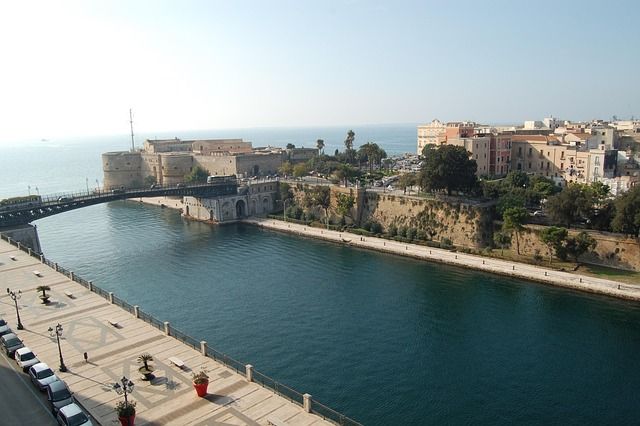The Just Transition Fund, dedicated to Taranto, has launched. The PIA and MiniPIA notices specific to that area have been published. The regional press release
Date:
07/07/2025

The Just Transition Fund, dedicated to Taranto, has launched. The PIA and MiniPIA notices specific to that area have been published. The regional press release
The Puglia Region, through its Department of Economic Development and its in-house company Puglia Sviluppo S.p.A., announces the publication of the notices "Taranto Integrated Incentive Programs" (PIA) and "Mini Integrated Incentive Packages for Micro and Small Enterprises Taranto" (MiniPIA).
Two new opportunities for businesses currently or to be located in the province of Taranto, looking to invest in their development and sustainable transition.
The notices, open to all applicants starting July 5, 2025, are aimed at technology startups and innovative SMEs, micro and small businesses, freelancers, small and medium-sized enterprises, including networks and/or consortia, with the aim of supporting integrated investments in the Taranto area and/or the province. This represents an opportunity to modernize production methods, diversify offerings, improve environmental sustainability, and strengthen the competitiveness of local businesses.
The new calls for proposals are funded by the Just Transition Fund (JTF), which supports the Taranto area (identified in Italy along with Sulcis Iglesiente in Sardinia) in its process of economic diversification and reconversion towards climate neutrality, addressing the socioeconomic challenges arising from this transition.
The measures aimed at the Taranto area are part of regional competitiveness initiatives, but they have their own specificities, not only geographically: they can benefit from an additional non-repayable grant available only through the Just Transition Fund. Taranto businesses will therefore achieve 10% more in productive investments than the rest of the region.
"The Puglia Region," stated President Michele Emiliano, "is committed to developing these initial calls for proposals. In the coming months, further measures will be released to incentivize local diversification activities, investment support, and labor policies in which the Puglia Region strongly believes. Especially during this crisis in Taranto's industrial system, we continue to work toward the commitment we made to the European Union."
"We need to rethink the competitiveness of local businesses. This is why the Region supports new production facilities and those seeking to adapt their structures and expertise to the objectives of the European Union's 2030 Agenda," stated Gianna Elisa Berlingerio, Director of the Economic Development Department. "These two public notices look to the future of this city, but from a sustainable perspective, so that competitiveness, investment attraction, and local development do not represent a cost to the Taranto community, but rather an opportunity to be seized to revitalize its productive sectors."
Mattia Giorno, President Emiliano's advisor for the Taranto area, said: "These initial calls for proposals are a source of satisfaction because we are at the beginning of a concrete process that we have been developing over the past few months, listening to local stakeholders and partners, finalizing the implementation plan, and anticipating that the coming years will see a series of calls for proposals that will allow the region to access special measures to support businesses, research systems, job training policies, and production facilities. These initial calls for proposals are just the beginning."
"With these tools," said Cosimo Borraccino, President Emiliano's advisor for the Taranto Plan Coordination, "we want to offer Taranto's businesses a concrete opportunity to invest in the region, focusing on innovation, sustainability, and quality jobs. A just transition is not just a goal, but a daily commitment to building a better future for our community."
The specific objective of the program (Just Transition Fund - JTF) is to enable the Taranto area to address the social, employment, economic, and environmental impacts of the transition towards the EU's 2030 objectives, as well as reengineer production cycles and initiate/consolidate circular economy processes. To this end, support is provided for industrial research, experimental development, technological and industrial innovation, productive investments, skills development for smart specialization, industrial transition, entrepreneurship, and business adaptability to change. This support includes the acquisition of advanced support services (including management, marketing, and design services) and the development of innovation processes, in order to consolidate and strengthen the competitiveness of the economic system by developing its production specializations.
The Puglia Region intends to facilitate the local entrepreneurial system through economic diversification, professional retraining, and Environmental remediation of the region by supporting investments by SMEs aimed at modernizing production methods and/or service delivery, improving knowledge transfer, identifying the most effective uses of technologies, and retraining the workforce with the necessary skills through a cross-sectoral approach to innovation.
MiniPIA
Companies may make investments in local units, such as the creation of new facilities, the expansion of existing ones, production diversification, or fundamental changes to production processes. Investments must be between €30,000 and €5 million and may include expenditures on machinery, construction work, patents, technologies, training, and environmental protection. The MiniPIA allows investments in local units located or to be located within the Province of Taranto and involving: the creation of a new facility; the expansion of the capacity of an existing facility; the diversification of a facility's production to produce products or services not previously manufactured or provided at that facility; or a fundamental change to the overall production process of the product(s) affected by the investment in the facility.
The incentives provide various forms of support, with the following aid intensities:
- Productive investments:
Micro and small businesses: up to 65% of expenses (45% non-repayable grant + 10% contribution towards plant costs + 10% guarantees)
Small businesses that acquire medium-sized enterprise status: up to 55% (35% non-repayable grant + 10% contribution towards plant costs + 10% guarantees)
- Innovation and processes:
Up to 50% contribution (30% non-repayable grant + 10% contribution towards plant costs + 10% guarantees)
- Training:
Micro and small businesses: up to 70% contribution
Medium-sized businesses: up to 60%
- Environmental protection and renewable energy:
Up to 65% for micro and small businesses, and 55% for businesses classified as medium-sized due to shareholding;
- Consulting services and trade fair participation:
Up to 50% contribution
PIA
With the PIA, investments can be made in local units located or to be located within the Province of Taranto for industrial research and experimental development activities to consolidate and strengthen the competitiveness of innovative SMEs and startups.
The PIA must include R&D projects and can be integrated with innovation projects; production investments; training projects; investments in environmental protection; acquisition of specialized consultancy, internationalization programs, and trade fair participation.
Access requests must concern integrated projects with a total amount of eligible expenses and costs of no less than €1 million.
The eligible aid intensities are as follows:
- Productive investments:
Medium-sized businesses 50%
Small businesses 60%
- Industrial research
Medium-sized businesses 60%
Small businesses 70%
- Experimental development
Medium-sized businesses 35%
Small businesses 45%
- Innovation and processes:
50% non-repayable grant for medium-sized and small businesses
- Training:
Small businesses: up to 70% grant
Medium-sized businesses: up to 60%
- Environmental protection and renewable energy:
Up to 65% for small businesses and 55% for medium-sized businesses
- Consulting services and trade fair participation:
Up to 50% grant for medium-sized and small businesses
Interested businesses must activate their profile through the online platform https://pugliasemplice.sistema.puglia.it/. After completing the proposal and obtaining the CUP code, businesses can submit their application for funding, which will be evaluated by Puglia Sviluppo. If successful, businesses will receive a grant of up to 65% of eligible expenses, in the form of a non-repayable grant, subsidized financing, and guarantees.
The calls for proposals are available in BURP no. 4 extraord. dated July 4, 2025, at the following link: https://burp.regione.puglia.it/documents/20135/2575464/N04STRAORD_04_07_2025.pdf/9aaf6725-1ad4-d851-16e5-802363a9610a?t=1751618838073
For further information, please consult the complete Notice on the Puglia Region website, in the "Calls and Notices" section, or contact the Economic Development Department in Bari directly. PEC: jtfpia.regione@pec.rupar.puglia.it ; piajtf.pugliasviluppo@pec.rupar.puglia.it
PEC: jtfminipia.regione@pec.rupar.puglia.it ; minipiajtf.pugliasviluppo@pec.rupar.puglia.it.
Websites: www.regione.puglia.it; https://pugliasemplice.sistema.puglia.it/; www.pugliasviluppo.eu
Pictured: Taranto, navigable canal, and Aragonese Castle.

